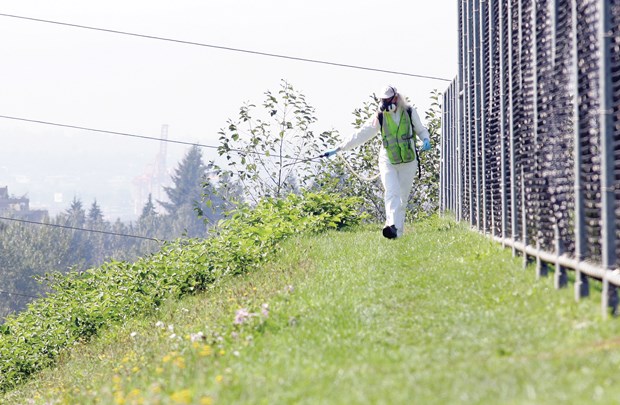The District of North Vancouver is currently trying to repel the biggest invasion of a non-native plant species in the municipality.
And they're pulling out the big guns to do it.
Workers were dispatched to the two-hectare scourge of Japanese knotweed adjacent to the upper sports fields at Inter River Park this month armed with sprayers full of the herbicide 2, 4-D.
Absorbed through the plant's surface, the mixture mimics hormones and spreads through the weed, ultimately starving its roots.
The district often uses the herbicide glyphosate, but elected to treat the broadleaf weeds with 2, 4-D instead.
"Glyphosate was not used as it would have damaged the grass on the fields," stated district communications director Jeanine Bratina.
The district recommends people stay out of the area for 24 hours following application.
As many as 10 signs were posted to advise park users spraying was taking place, according to Bratina.
Japanese knotweed was previously treated with glyphosate following a failure to uproot the plants, said the district's sustainability section manager Julie Pavey.
"It's so vigorous it can't be dug out successfully because the rhizomes spread very quickly underground and they can go as deep as five metres," she said, speaking about
the issue in July.
A rhizome as small as two millimetres can grow a new plant, according to the district's website.
The weed crowds out native plants, reducing local biodiversity and limiting animals' food sources. Knotweed has also been known to sprout through roads and retaining walls.
The only feasible method of controlling knotweed is with pesticides, according to the district.
Larger knotweed plants are injected with herbicides while smaller stalks needs to be sprayed as injection would break the stem, according to Pavey.
Knotweed is exceptionally durable, thriving in cold, moist, and dry conditions.
The district has recently proposed a municipalitywide ban on unregulated fill in an attempt to stem the spread of the dominating weed.
But use of herbicides remains controversial.
A 1997 study of Ontario farmers conducted by the North Carolina school of public health found the rate of pre-term births increased with the use of herbicides including glyphosate. Monsanto, manufacturer of the herbicide, criticized the study for relying exclusively on self-reporting.
A 13-week study in which mice were fed high doses of glyphosate determined their organs became heavier while their growth was stunted.



